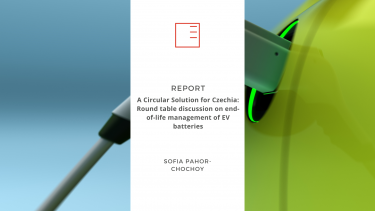iDnes.cz | What exactly is in the migration pact
The European Union has approved a migration pact, and from 2026 individual states will either accept their share of refugees or pay to opt out of this obligation. However, since the Czech Republic has already accepted a large number of refugees since the outbreak of the war in Ukraine, it should temporarily be exempt from this obligation. However, as noted by Viktor Daněk, deputy director of the Institute for European Policy EUROPEUM, this is not an exemption explicitly granted to Czechia. Exemptions are determined based on the number of people granted asylum or similar protection in a given country.
Show moreReport | A Circular Solution for Czechia: Round table discussion on end-of-life management of EV batteries
On April 11, 2024, EUROPEUM Institute for European Policy along with its partner INCIEN Institute for Circular Economy, held a roundtable titled A Circular Solution for Czechia. This round table was part of a project called The End-of-Life Management of the Automotive Industry and the Opportunities for Czechia.
Show morePolicy Paper | FROM STICK SHIFT TO SKILL SHIFT? Reskilling of automotive's employees in the eyes of the industry's stakeholders
There is no time to wait in retraining the employees of car manufacturers if we do not want our car industry to fossilize and disappear. Writes Rebeka Hengalová, research fellow at EUROPEUM Institute.
Show moreCNN Prima News | European migration pact: does the Czech Republic have an exemption or not?
The Chamber of Deputies discussed the EU Migration Pact for over three hours. The opposition criticises the pact and claims that it indirectly introduces quotas. At the same time, there is uncertainty about the interpretation of a possible exemption. What does the pact stipulate and what impact could it have on the Czech Republic? Viktor Daněk, deputy director of the EUROPEUM Institute for European Policy, commented for Partie Plus on CNN Prima News.
Show moreThink Visegrad Fellowship offer: Call for proposals 2024
The Think Visegrad platform, which brings together think tanks from the Visegrad countries, including the EUROPEUM Institute for European Policy, is offering eight visiting fellowships to non-Visegrad expert fellows for the period Summer/Autumn/Winter of 2024. The duration of fellowships varies from 6 to 8 weeks (based on agreement with the hosting institute).
Show moreThink Visegrad Fellowship offer: Call for proposals 2024
The Think Visegrad platform, which brings together think tanks from the Visegrad countries, including the EUROPEUM Institute for European Policy, is offering eight visiting fellowships to non-Visegrad expert fellows for the period Summer/Autumn/Winter of 2024. The duration of fellowships varies from 6 to 8 weeks (based on agreement with the hosting institute).
Show moreRegional Climate Policies: Will European Climate Policy Help Save the Jizerská 50?
We invite you to a debate titled "Regional Climate Policies: Will European Climate Policy Help Save the Jizerská 50?," focusing on the impact of climate change on a specific case in the Liberec Region. The event will take place on Monday, April 22nd, starting at 18:00 at the Fryč Bookstore and Second-hand Bookstore.
Show more20 Years of Reuniting Europe’s East and West: Is the EU Ready for Another “Big Bang” Enlargement?
We would like to invite you to a debate on a topic "20 Years of Reuniting Europe’s East and West: Is the EU Ready for Another “Big Bang” Enlargement?" The debate will take place on Thursday, April 4, from 16:00 to 17:15 h at Prague University of Economics and Business.
Show moreČT24 | The European Parliament approved new migration rules
The package consists of ten legislative proposals. Its support was by no means certain, with the fractions counting every vote. What demands does this comprehensive package place on the Member States? And does the package contain mandatory quotas, as the Czech opposition claims? Viktor Daněk, deputy director of the EUROPEUM Institute for European Policy, commented on the approval process of the new legislative package for ČT24.
Show morePolicy Paper | Securing Europe’s Lithium Future: The Cinovec project and sustainable lithium mining
The EU's proactive stance, introduced in the Critical Raw Material Strategy and later Critical Raw Materials Act (CRMA), drives the EU approach to secure the supply of European/domestic critical raw materials for EV battery production. The Cinovec project has a large economic potential as it enhances the ability to secure domestic and regional supply of lithium, which is otherwise very geographically concentrated outside of Europe. Europe relies on a handful of countries, particularly China, for the import of lithium for the production of EV batteries.
Show moreStaroměstské náměstí 4/1
Prague 1 - Staré Město
110 00
tel.: +420 212 246 552
email: europeum@europeum.org
https://www.europeum.org








